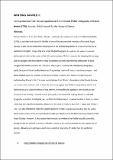Files in this item
An experimental ‘Life’ for an experimental life : Richard Waller's biography of Robert Hooke (1705)
Item metadata
| dc.contributor.author | Moxham, Noah | |
| dc.date.accessioned | 2016-05-31T14:30:04Z | |
| dc.date.available | 2016-05-31T14:30:04Z | |
| dc.date.issued | 2016-03 | |
| dc.identifier | 241226634 | |
| dc.identifier | d6df9c1a-2616-4f81-9d7c-35c766b8b665 | |
| dc.identifier | 84957991296 | |
| dc.identifier | 000372102100002 | |
| dc.identifier.citation | Moxham , N 2016 , ' An experimental ‘Life’ for an experimental life : Richard Waller's biography of Robert Hooke (1705) ' , British Journal for the History of Science , vol. 49 , no. 1 , pp. 27-51 . https://doi.org/10.1017/S0007087416000029 | en |
| dc.identifier.issn | 0007-0874 | |
| dc.identifier.uri | https://hdl.handle.net/10023/8903 | |
| dc.description.abstract | Richard Waller's ‘Life of Dr Robert Hooke’, prefixed to his edition of Hooke's Posthumous Works (1705), is an important source for the life of one of the most eminent members of the early Royal Society. It also has the distinction of being one of the earliest biographies of a man of science to be published in English. I argue that it is in fact the first biography to embrace the subject's natural-philosophical work as the centre of his life, and I investigate Waller's reasons for adopting this strategy and his struggle with the problem of how to represent an early experimental philosopher in print. I suggest that Waller eschews the ‘Christian philosopher’ tradition of contemporary biography – partly because of the unusually diverse and fragmentary nature of Hooke's intellectual output – and draws instead upon the structure of the Royal Society's archive as a means of organizing and understanding Hooke's life. The most quoted phrase from Waller's biography is that Hooke became ‘to a crime close and reserved’ in later life; this essay argues that Waller's biographical sketch was fashioned in order to undo the effects of that reserve. In modelling his approach very closely on the structure of the society's records he was principally concerned with making Hooke's work and biography accessible, intelligible and useful to the fellowship in a context familiar to them, a context which had provided the institutional framework for most of Hooke's adult life. I argue that Waller's ‘Life’ was also intended to make the largest claims for Hooke's intellectual standing that the author dared in the context of the enmity between Hooke and Isaac Newton once the latter became president of the Royal Society. However, I also adduce fresh manuscript evidence that Waller actually compiled, but did not publish, a defence of Hooke's claim to have discovered the inverse square law of gravity, allowing us to glimpse a much more assertive biography of Hooke than the published version. | |
| dc.format.extent | 25 | |
| dc.format.extent | 1472449 | |
| dc.language.iso | eng | |
| dc.relation.ispartof | British Journal for the History of Science | en |
| dc.subject | History | en |
| dc.subject | History and Philosophy of Science | en |
| dc.subject | SDG 16 - Peace, Justice and Strong Institutions | en |
| dc.title | An experimental ‘Life’ for an experimental life : Richard Waller's biography of Robert Hooke (1705) | en |
| dc.type | Journal article | en |
| dc.contributor.institution | University of St Andrews. School of History | en |
| dc.identifier.doi | 10.1017/S0007087416000029 | |
| dc.description.status | Peer reviewed | en |
This item appears in the following Collection(s)
Items in the St Andrews Research Repository are protected by copyright, with all rights reserved, unless otherwise indicated.

